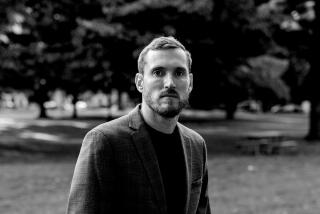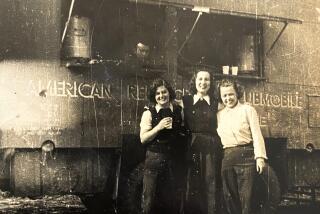Some Tales are Best Left Untold
- Share via
Nearly six decades ago, Los Angeles teenager Nick Martin joined the Army Air Force and went to Europe to fight World War II. He arrived in the last week of 1944, serving as a radio operator aboard Troop Carrier Command aircraft flying supplies and personnel to and from the front lines as Allied troops made the final push to end the war.
Martin wrote home regularly, occasionally spicing up the correspondence with his cartoons. After the war, he returned to Southern California, earned a bachelor’s degree and enjoyed 40 years as an advertising copywriter and artist. Last spring, he and his wife of 52 years, Mary, moved to Henderson, Nev., where they live in a “beautiful new house on a hilltop overlooking the entire Las Vegas Valley.”
The war experiences returned when his mother passed away and he discovered a shoe box containing his wartime letters. They reveal a young man who, like many servicemen, withheld details of the risks he faced so as to avoid raising fears for his safety. Here’s a sample of that correspondence, enriched by Martin’s thoughts five decades later--and a few of those details withheld from Mom.
*
I was in the 9th Air Force, stationed in the lovely little town of Chateaudun, whose medieval castle clung to a high escarpment overlooking the Loire Valley of France. One of my squadron’s duties was daily ferrying jerrycans of gasoline to the front for Gen. Patton’s tanks, which were racing across Germany in the final months of the war.
*
2 May 1945
Dear Mom,
It has been over two weeks since I wrote you last, but it couldn’t be helped. I have been in Holland for the last couple of weeks.
I think I told you we have been flying supplies to the front in Germany. A couple weeks ago we were flying back from Germany, and as we crossed the Rhine our wing hit a barrage balloon cable. It took a hunk out of our wing, but we landed safely in Holland.
I didn’t tell her that the balloon had a dynamite charge that slid down the cable, exploded and set shrapnel tearing through the plane, some of it just a couple feet from my head. Nor did I tell her the “supplies” we had been carrying were hundreds of gallons of gasoline, and how lucky we were it had already been offloaded.
I also didn’t tell her that after the 4-foot stretch of the trailing edge of our left wing had been blown off, the ship began shaking violently. As radio operator, I took time to message the base to tell what had happened. When I left my compartment, I found crew members wearing parachutes standing at the now-removed back door waiting for the captain’s order to jump. I quickly looked around for a chute of my own. There were none. Through error, the ground crew had put one too few on board. I lurched back to the men hanging on at the open door, shouting above the din, “Say, you guys didn’t see an extra parachute anywhere, did you?”
No, they said. Then one of them added, “We’d do anything in the world for you, Martin, but, uh . . . .”
I stumbled to the front of the plane, where the captain was fighting his quivering wheel, and told him my predicament. He ordered everyone to hang tight; he would try to set it down.
The Germans still held the northern Netherlands, but the Allies controlled the south. We made a bumpy landing at a British Royal Air Force base near Eindhoven.
My letter went on:
The crew chief and I were left there to stay with the plane until it could be repaired, and the officers took another plane back to France. Tommy (the crew chief) and I moved in with eight other GIs who were stationed there at the town. It was a very nice town, and there were only about twenty Yanks in the whole city, although there were a lot of Limey soldiers. The place was just teeming with women, who were very friendly. And the beauty of it was that they could all speak some English. I didn’t have to speak a word of Dutch, although I picked up “Ja,” “Nay” and “Niks en de winkel,” which is their favorite expression.
“Niks en de winkel” literally means, “Nothing in the shop.” The Dutch used it figuratively to sum up wartime life, as a Frenchman would say, “C’est la guerre.”
All the people were friendly. The little kids would run up beside us and grab our hands, or clomp along behind us in their wooden shoes, chanting “Amerikhan,” or “Hey, Yankee!”
Very seldom would they ask for gum or candy like the French kids do. It’s nice when people are friendly just for the sake of being friendly. Several nights I spent in Dutch homes, and the people were more than hospitable.
There were no American officers or MPs in town [and not only was the RAF no problem, but they were kind enough to share their club and sergeants’ mess with us].
The only clothes I had were those I had on--coveralls, leather jacket and jockey cap. And that is the way I went to town every evening. I imagine I cut quite a figure sitting in a a nice cafe in my green coveralls, and a waiter in bow tie and tails lighting my cigarette for me.
One night I attended a dance. In the course of the evening I went to the restroom. I emphasize the, as there was only one. As I stood at the urinal, a bevy of young women gathered in the open doorway, watching, chattering and giggling. Talk about your mixed emotions.
After two weeks when the plane was ready to go back to the base, the pilot and co-pilot arrived to take the ship back to [Chateaudun, or so I thought].
I found instead we were going to a makeshift airstrip between Verdun and Metz. The flying element of our outfit had moved to this spot near the German border to make two missions a day to the eastward-advancing front lines. And in the final weeks of the war, after unloading our gasoline cargo, we’d pick up newly freed Allied POWs and ferry them west.
When I arrived at our new base . . . I was still without extra clothing, so yesterday I hopped a plane [back to Chateaudun]. When I got there, I found that a guy was sleeping in my sack, so I had to evict him. I had to look into a half dozen bars in town before I found another buddy who was wearing my field jacket and one of my hats. Another hat of mine I got from another guy the next morning. Five packs of cigarettes were missing, and I never did find my mess kit and cup. I later found out that someone had fried eggs in my kit and burned it all to hell, so he threw it away. Outside of this, my belongings were pretty much the way I left them over two weeks ago.
I packed my stuff and flew back [to the new forward base], where I am now.
Here we live in tents and the mud is knee deep outside. It turned cold and rainy about a week ago.
The rest of the letter is just routine family matters. No, I haven’t stopped the $10 war bonds. No, I can’t write on both sides of the paper, for fear the censor will cut huge holes in my letters. Needless to say, we won the war and lived happily ever after.
Oh, there was was one other thing I didn’t tell Mom in my letter. When I retrieved my last missing bit of gear from one of the guys at the old base, he said, “Gee, sorry, Martin, we all thought you were dead.”
More to Read
Sign up for Essential California
The most important California stories and recommendations in your inbox every morning.
You may occasionally receive promotional content from the Los Angeles Times.










